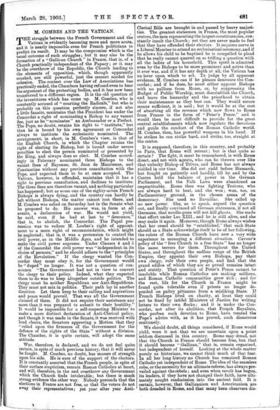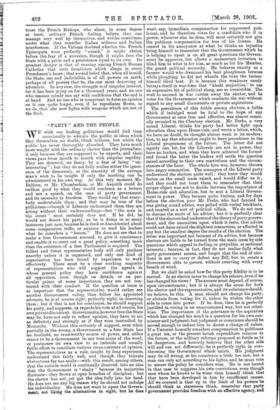M. COMBES AND THE VATICAN.
THE struggle between the French Government and the Vatican is evidently becoming more and more acute, and it is nearly impossible even for French politicians to predict its result. It may be the compromise which is the usual outcome of such struggles ; but it may also be the formation of a " Gallican Church " in Prance, that is, of a Church practically independent of the Papacy ; or it may be the overthrow of the Republic, the Church lending to the elements of opposition, which, though apparently crushed, are still powerful, just the cement needed for cohesion. The contest over the Law of Associations has practically ended, the Chambers having refused even to hear the argument of the protesting bodies, and it has now been transferred to a different region. It is the old question of the investitures which has come up. M. Combes, who is constantly accused of " courting the Radicals," but who is .probably on this question perfectly sincere, if not also a little fanatic, maintains that, the President has under the Concordat a right of nominating a Bishop to any vacant See, just as he " nominates " an Ambassador or a Prefect. The Pope, no doubt, retains his right to " institute," but then he is bound by his own agreement or Concordat always to institute the ecclesiastic nominated. The arrangement, in short, in M. Combes's view, is that of the English Church, in which the Chapter retains the right of electing its Bishop, but is bound under severe penalties to elect the person nominated or presented by the King, and always does so elect. M. Combes accord- ingly in February nominated three Bishops to the vacant Sees of Bayonne, St. Jean de Maurienne, and 'Constantine without any previous consultation with the Pope, and expected them to be at once accepted. The Vatican, however, is offended, maintains that it has a right to previous consultation, and declines to institute. The three Sees are therefore vacant, and nothing particular has happened; but as some one of the eighty-seven French Bishops is always dying, and the country can hardly be left without Bishops, the matter cannot rest there, and M. Combos was asked on Saturday last in the Senate what he proposed to do. His answer was, in form at all events, a declaration of war. He would not yield, he said, even if he had at last to " denounce," that is, to abolish, the Concordat. The Papal pre- tension was to reduce M. Loubet's right of appoint- ment to a mere right of recommendation, which might be neglected ; that is, it was a pretension to control the civil power, as in the Middle Ages, and he intended to make the civil power supreme. Under Clauses 4 and 5 of the Concordat the civil power was " independent in its choice of persons," and he should adhere to the " principles of the Revolution." If the clergy wanted the Con- cordat they must obey it, for the Government would be "duped" no longer. It was not a question of con- science. " The Government had not in view to convert the clergy to their policy. Indeed, what they expected them to do was to keep altogether outside politics. The 'clergy must be neither Republican nor Anti-Republican. They must not mix in politics. Their path lay in another direction. Let them keep to their calling and aspirations and peace would prevail. That was all the Government claimed of them. It did not require their assistance any more than it was prepared to submit to their hoitility.' It would be impossible for a self-respecting Minister to make a more distinct declaration of Anti-Clerical policy, and though it was made in the Senate, it was received with 'loud cheers, the Senators approving a Motion that they " relied upon the firmness of the Government for the defence of the rights of the State " without a division. The Chamber, it is quite certain, will adopt the same attitude.
War, therefore, is declared, and we do not feel quite certain, in spite of much previous history, that it will never be fought. M. Combos, no doubt, has masses of strength upon his side. He is sure of the support of the electors. It is constantly asserted that the French people, in spite of their surface scepticism, remain Roman Catholics at heart, and will, therefore, in the end overthrow any Government which the Church finds intolerable; but there is much ;strong evidence the other way. Nobody pretends that the elections in France are not free, or that the voters do not sway their representatives; yet year after year Anti- Clerical Bills are brought in and passed by heavy majori- ties. The greatest statesmen in France, the most popular orators, the men representing the largest constituencies, con- stantly insult the Church ; yet they are never made to feel that they have offended their electors. It requires nerve in a Liberal Member to attend an ecclesiastical ceremony, and if he allows his child to be baptised he is compelled to plead that he really cannot quarrel on so trifling a question with all the ladies of his household. This spirit is admitted even by the Bishops to be more prominent and active than it ever was, and if it has any depth at all, the Vatican has no lever upon which to act. To judge by all apparent evidence, M. Combos can if he pleases denounce the Con- cordat ; and if he does, he must either appoint Bishops with no pallium from Rome, or, by suppressing the Budget of Public Worship, must disestablish the Church, and leave the hierarchy and the priesthood to obtain their maintenance as they best can. They would secure means sufficient, it is said ; but it would be at the cost of absorbing all the revenue which now flows to Rome from France in the form of " Peter's Pence," and it would then be most difficult to provide for the great central establishments which now regulate the devotions and guide the conduct of the Roman Catholic world. M. Combos, then, has powerful weapons in his hand. If he strikes he can strike hard, and strike, too, straight at the centre.
It is supposed, therefore, in this country, and probably in Paris, that Rome will retreat ; but is that quite so certain ? The fight, it must be remembered, is with Rome direct, and not with agents, who can be thrown over like that unlucky Bishop of Troves, and Rome has not always yielded in our time. She did not yield before Bismarck, but fought on patiently and hardily, till by and by the Centre held the balance of power in the German Parliament, and the Falk Laws were abandoned as impracticable. Rome then was fighting Teutons, who are always hard to .beat, and she won ; won, too, on Parliamentary ground, in the 'chosen arena of the democracy. She used no Ravaillac. She called up no new power.- She, so to speak, argued the question out, and finally convinced all German statesmen, if not all Germans, that needle-guns will not kill ghosts. She made that effort under Leo XTTT., and he: is still alive, and she may make it again. Moreover, though Rome always wishes that her creed should be "established," that each State should as a State acknowledge itself to be of her following, the rulers of the Roman Church have now a very wide experience in managing a different situation. Cavour's policy of the " free Church in a free State " has no longer the same terrors for them. Throughout the , United States, and throughout the endless range of the British Empire, they appoint their own Bishops, pay their own clergy, rule their own people, and find that the grand edifice of which they are so proud remains intact and stately. That question of Peter's Pence cannot be insoluble while Roman Catholics are making millions, and Roman Catholic communities grow rich ; and for the rest, life for the Church in France, might be found quite tolerable even if priests no longer de- pended on paltry pittances from a misliking State. If French Bishops lived on charity, at least they could. not be fined by infidel Ministers of Justice for writing letters to their own flocks ; and it is under the Con- cordat,' not after its abolition, that French Royalists, who profess such devotion to Rome, ha4e treated the Pope's advice with, as it 'has proved, such disastrous contumely.
We should doubt, all things considered, if Rome would yield, were it .not that we are uncertain upon a point seldom discussed in this country. Rome may dread, not that the Church in. France should .become free, but. that it should become " Gallican," that is, remain organised, but independent of. herself. Looking at the whole matter _purely as historians, we cannot think- much of that fear. In all her long history no Church has remained Roman Catholic yet independent of Rome. The idea of the seamless robe, or the necessity for an ultimate referee, has alwaye pre- vailed against the rebels ; and even, when revolt has begun, its leaders, if they have not changed their faith, have ulti- mately sought readmission into the ancient fold. It ie certain, however, that Gallicanism and Americanise; are both dreaded in Rome, and that many keen observers dis- trust the French Bishops, who share, in some degree at least, ordinary French feeling, believe they can manage very well by themselves, and writhe sometimes under what they consider Italian wiliness and Italian interference. If the Vatican doubted whether the French Episcopate were perfectly " sound," it might shrink before the fear of a secession, though it might face the State with a pride and a persistence equal to its own. Its greatest danger is that of rousing among French Roman Catholics that civic fanaticism which sleeps in every Frenchman's heart ; that rooted belief that, when all is said, the State, one and indivisible, is of all powers on earth, perhaps of all powers that be, the one most deserving of adoration. In any case, the struggle is of singular interest, for it has been going on for a thousand years, and no one who reasons calmly can say with confidence that the end is at hand. And no one who is competent to form an opinion on it can quite forget, even if he repudiates Rome, as we do, that she now fights with weapons which are not of the flesh.











































 Previous page
Previous page